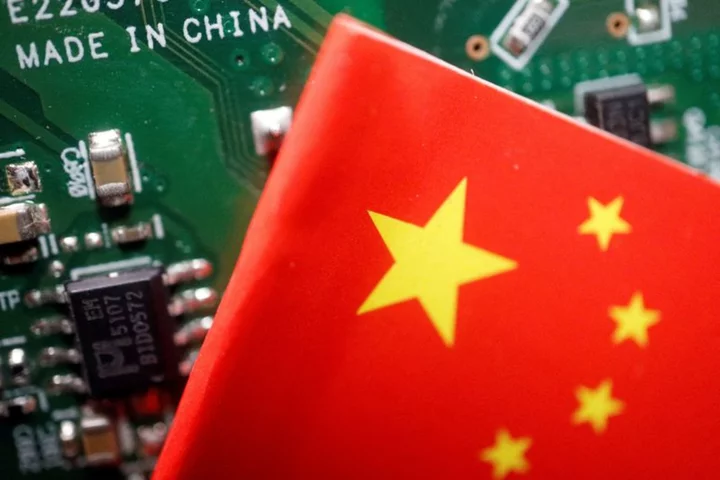By Julie Zhu, Kevin Huang, Yelin Mo and Roxanne Liu
HONG KONG/BEIJING China is set to launch a new state-backed investment fund that aims to raise about $40 billion for its semiconductor sector, two people familiar with the matter said, as the country ramps up efforts to catch up with the U.S. and other rivals.
It is likely to be the biggest of three funds launched by the China Integrated Circuit Industry Investment Fund, also known as the Big Fund.
Its target of 300 billion yuan ($41 billion) outdoes similar funds in 2014 and 2019, which according to government reports, raised 138.7 billion yuan and 200 billion yuan respectively.
One main area of investment will be equipment for chip manufacturing, said one of the two people and a third person familiar with the matter.
President Xi Jinping has long stressed the need for China to achieve self-sufficiency in semiconductors. That need has become all the more pressing after Washington imposed a series of export control measures over the last couple of years, citing fears that Beijing could use advanced chips to boost its military capabilities.
In October, the U.S. rolled out a sweeping sanctions package that cut China's access to advanced chipmaking equipment and U.S. allies Japan and the Netherlands have taken similar steps.
The new fund was approved by Chinese authorities in recent months, two of the people said.
China's finance ministry is planning to contribute 60 billion yuan, said one person. Other contributors could not be immediately learned.
All the sources declined to be identified as the discussions were confidential.
The State Council Information Office, which handles media queries on behalf of the government, the finance ministry and the Ministry of Industry and Information Technology did not immediately respond to Reuters requests for comment.
The Big Fund also did not immediately respond to requests for comment.
INVESTMENTS TO DATE
The fundraising process will likely take months and it was not immediately clear when the third fund will be launched or if further changes will be made to the plan, said the first two sources.
Backers of the Big Fund's previous two funds include the finance ministry and deep-pocketed state-owned entities such as China Development Bank Capital, China National Tobacco Corporation and China Telecom.
Over the years, the Big Fund has provided financing to China's two biggest chip foundries, Semiconductor Manufacturing International Corporation and Hua Hong Semiconductor, as well as to Yangtze Memory Technologies, a maker of flash memory and a number of smaller companies and funds.
Despite those investments, China's chip industry has struggled to play a leading role in the global supply chain, especially for advanced chips.
INVESTMENT MANAGERS
The Big Fund is considering hiring at least two institutions to invest the new fund's capital, said the three people.
Several senior officials and former officials at SINO-IC Capital, the sole manager for the Big Fund's first two funds, have been under investigation by China's anti-graft authority since 2021.
Even so, SINO-IC Capital is expected to remain one of the managers for the third fund, said two of the people.
SINO-IC Capital did not immediately respond to a request for comment.
Chinese officials have also reached out to China Aerospace Investment, the investment arm of state-owned China Aerospace Science and Technology Corporation, to discuss being one of the managers, said two of the people.
China Aerospace Investment did not immediately respond to a request for comment.
($1 = 7.2901 Chinese yuan)
(Reporting by Julie Zhu, Kevin Huang, Yelin Mo and Roxanne Liu; Editing by Sumeet Chatterjee and Edwina Gibbs)









